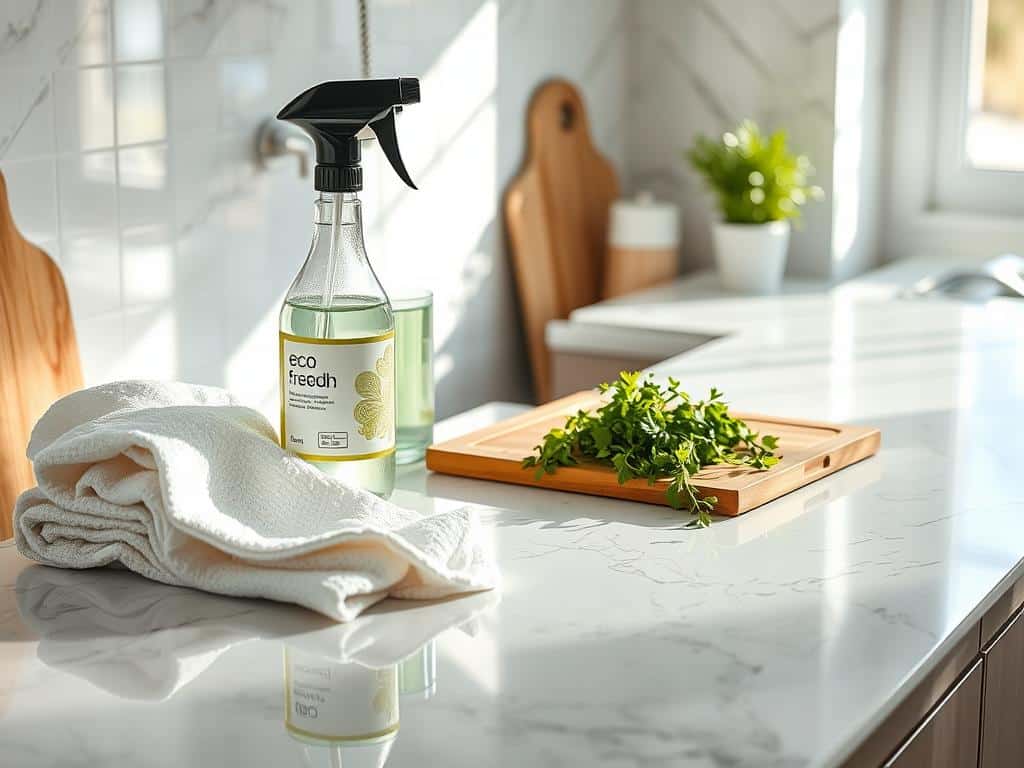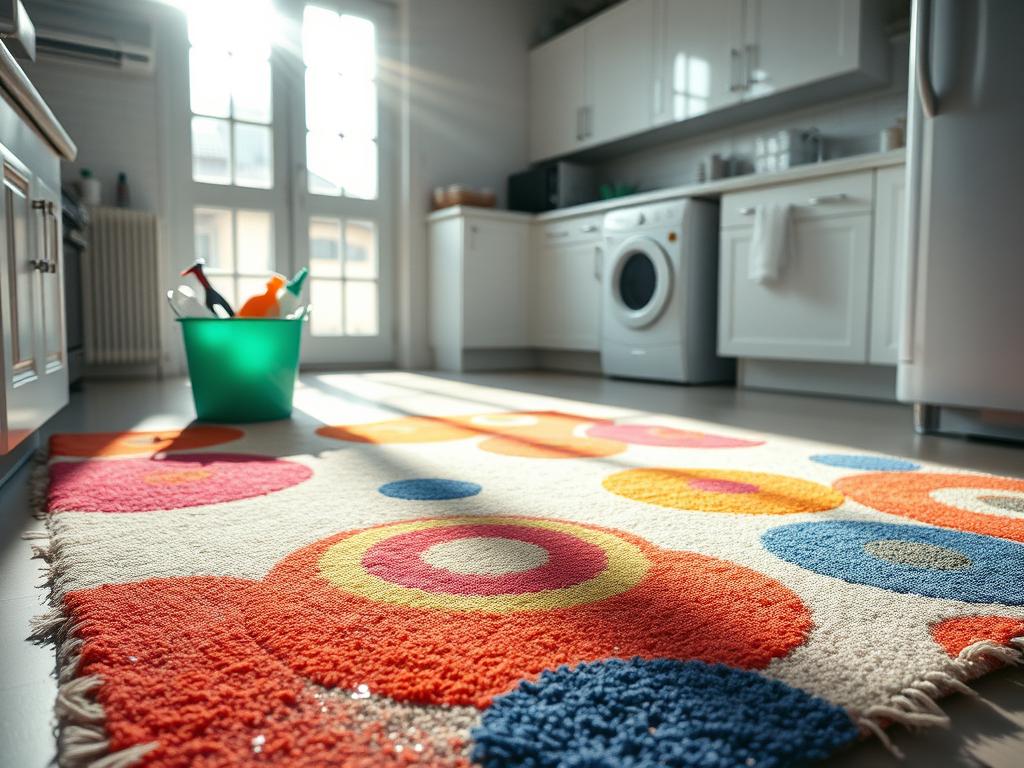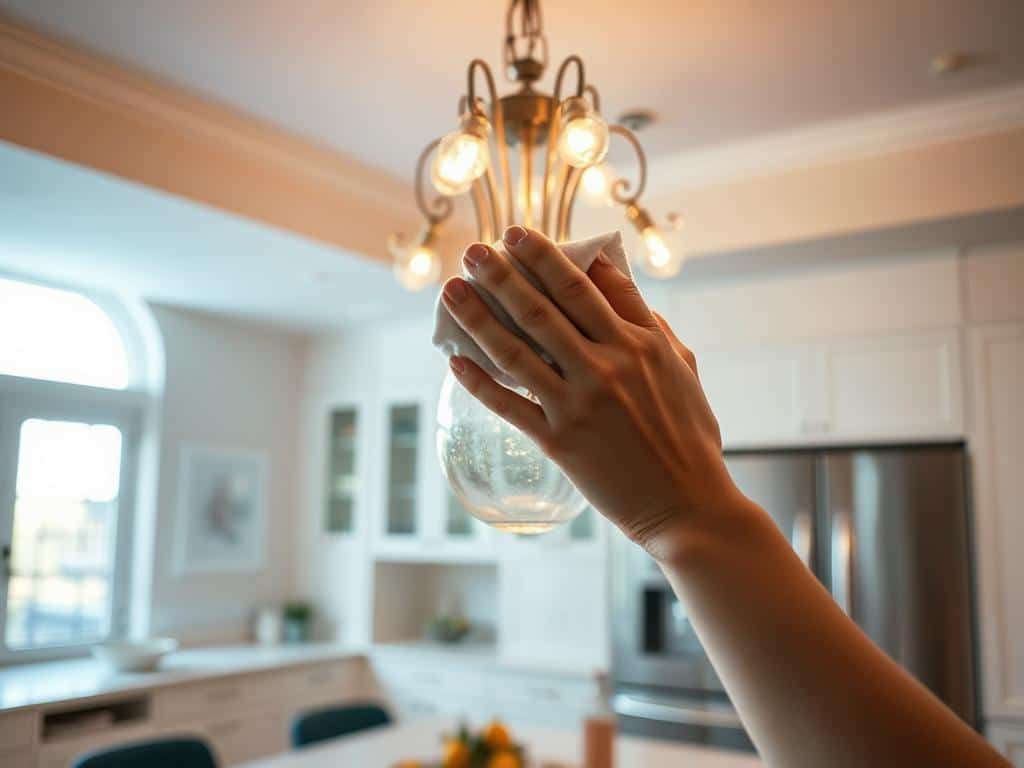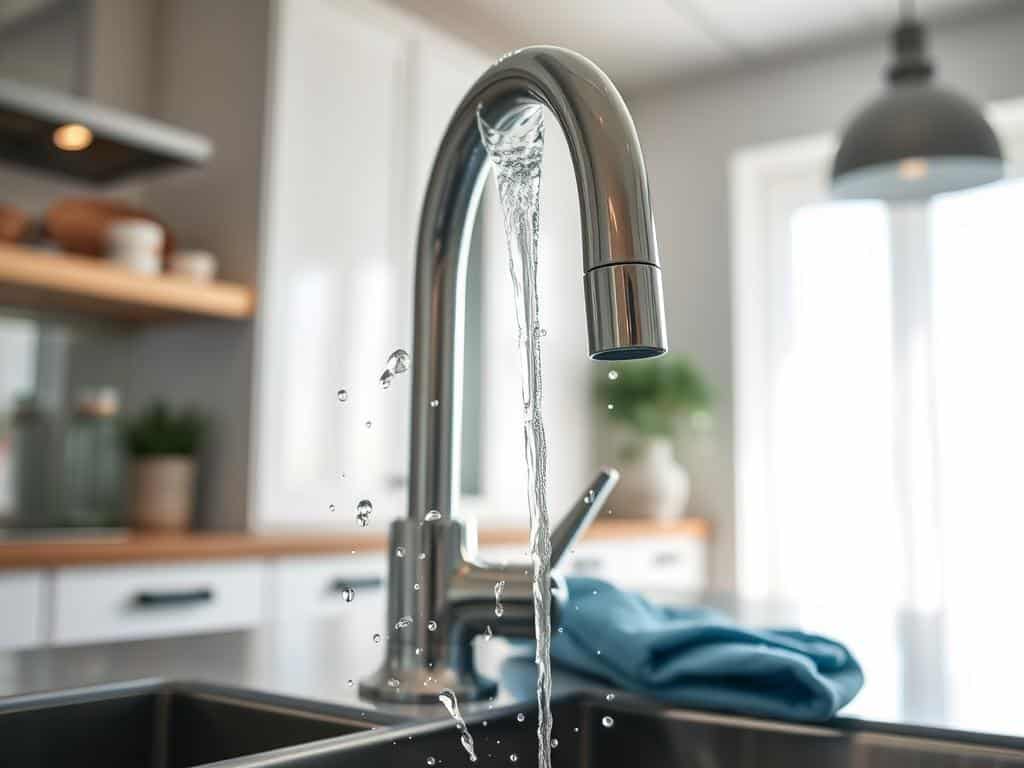
Kitchen countertops are one of the most frequented surfaces in the home and thus require regular, detailed cleaning. While daily wipe-downs are standard, occasionally, countertops need a thorough cleaning from corner to corner to maintain hygiene and appearance. Using the correct cleaning supplies for the countertop material is crucial, as not all products are suitable for every surface.
There can be damages from inappropriate cleaning agents, as harsh citrus ingredients can etch porous stones like granite and marble. It’s vital to choose products specifically formulated for the countertop material, with mild dish soap and water often being a safe alternative. This approach ensures effective countertop cleaning and helps in preventing potential damage, thus supporting proper kitchen countertop maintenance.
Proper kitchen countertop maintenance involves understanding the unique characteristics of materials. For instance, granite countertops should not be cleaned with vinegar because it can compromise the stone’s integrity and damage the sealant used. Quartz countertops, although resilient, can handle harsher cleaning products but may suffer premature wear from frequent chemical use, necessitating careful maintenance.
Caring for different countertop materials properly not only keeps them looking their best but also extends their lifespan. This guide will help you learn the effective countertop cleaning methods tailored to ensure your kitchen surfaces remain spotless and well-maintained.
Pre-Cleaning Steps
Starting with countertop pre-cleaning routines is crucial for an effective cleaning process. Ensuring your kitchen countertops are free of dust, crumbs, and debris will make it easier to clean and sanitize the surfaces.
Clearing the Surface
Before you begin deep cleaning, remove all appliances and items from the countertop to avoid obstructing the cleaning process. Use a microfiber cloth, paper towel, or counter brush to clear the surface efficiently. This step is paramount in preparing countertops for cleaning effectively.
Necessary Supplies
Gathering the essential cleaning supplies is the next vital step. The necessary materials vary based on the countertop material but commonly include:
- Microfiber cloths
- Non-abrasive scrub pads
- Dish soap
- Stone-specific cleaners
- Appropriate disinfectants like a solution of bleach or vinegar
For instance, when cleaning butcher-block countertops, you might need a bleach and water solution to disinfect the surface. On the other hand, for granite and marble, use a water and soap solution. It’s important to tailor your cleaning methods to the specific material to avoid any damage. For detailed methods on cleaning specialty items, you can check out this guide.
Cleaning Different Countertop Materials
To effectively clean kitchen countertops, it’s essential to understand the distinct cleaning requirements for each material. By adhering to the right techniques and using appropriate products, you can maintain the beauty and functionality of your countertops, ensuring their longevity.

Granite and Marble
For cleaning granite countertops and marble surfaces, it’s crucial to avoid acidic cleaners that might cause etching. Instead, opt for stone-specific cleaning sprays or a gentle dish soap mixed with water. Both granite and marble are porous, necessitating regular sealing to protect against stains and damage. An antibacterial dish soap mixed with hot water can effectively disinfect marble without compromising its integrity.
Laminate
Maintaining laminate surfaces is straightforward, thanks to their inherent resistance to heat, stains, and germs. Use a soft cloth and mild dish soap to clean the surface, avoiding harsh or abrasive formulas. Given their durability, laminate countertops do not require sealing, simplifying their upkeep. Regular cleaning ensures they remain hygienic and visually appealing.
Butcher Block
Butcher block surfaces need specific care due to their role in food preparation. Clean these surfaces with mild dish soap and water, ensuring they are sanitized regularly with a diluted bleach solution. Applying mineral oil monthly helps protect the wood from moisture, preventing stains and maintaining its appearance. Consistent butcher block care is essential for longevity.
Quartz
Quartz countertops are known for their durability and ease of maintenance. Quartz countertop cleaning requires only a quartz-approved cleaner or mild dish soap, as the resin content naturally seals the stone, eliminating the need for additional sealing. Avoid using abrasive cleaning tools to prevent surface damage. Regular cleaning will keep your quartz countertops looking pristine and robust.
| Countertop Material | Cleaning Method | Special Notes |
|---|---|---|
| Granite | Non-acidic cleaner, mild dish soap | Regular sealing required |
| Marble | Gentle, non-acidic cleaner, hot water with antibacterial soap | Regular sealing required, avoid harsh disinfectants |
| Laminate | Soft cloth with mild dish soap | No sealing required, avoids harsh chemicals |
| Butcher Block | Mild dish soap, diluted bleach for sanitation | Monthly mineral oil application |
| Quartz | Quartz-approved cleaner, mild dish soap | No sealing required, avoid abrasives |
Techniques for Stain Removal
Cleaning persistent countertop stains can be a straightforward task with the right techniques tailored to specific countertop materials. Employing the correct countertop stain removal methods ensures that your kitchen surfaces are restored to their original state.
For organic stains, such as coffee or red wine, on natural stone countertops like granite and marble, a poultice method is highly effective. Mix baking soda and water into a thick paste, apply it to the stain, cover with plastic wrap, and let it sit for 24 hours before wiping clean. This technique excels in lifting deep-set stains specific to these surfaces.
Kitchen surface stain solutions for wooden butcher-block countertops involve natural cleaners like lemon and salt. Simply rub a cut lemon sprinkled with salt over the stain, allowing the natural acidity and abrasiveness to lift the marks. Afterwards, rinse thoroughly with a damp cloth. Similarly, laminate countertops are generally stain-resistant but may need baking soda paste for tougher stains. Apply the paste and gently scrub with a soft cloth for effective stain removal.
Rust stains can appear on granite countertops due to prolonged exposure to metal objects. For these stubborn marks, a specific poultice or commercial rust remover designed for stone surfaces should be used. It’s important to follow up with immediate rinsing to prevent further discoloration.
Stainless steel countertops, although resilient, can suffer from hard water stains. A simple homemade remedy involves applying a mixture of white vinegar and water to the stains with a soft cloth or spray bottle, ensuring that abrasive cleaners are avoided to protect the surface.
Different stains on quartz countertops, which are non-porous and resistant to staining, can be effectively treated with dish soap and baking soda paste. This simple yet effective method restores the countertop’s cleanliness without the risk of damage. Vinegar can also be utilized for persistent stains, along with other specialized quartz cleaners.
Addressing stains on laminate countertops requires applying a baking soda paste. This paste should sit for 5-10 minutes before gentle scrubbing with a soft cloth. Hardier stains may necessitate the repetition of this process. Avoid using abrasive tools on laminate to prevent surface scratches.
| Countertop Material | Recommended Stain Removal Method | Common Stains |
|---|---|---|
| Granite | Baking soda paste (poultice) | Oil, Wine, Coffee |
| Marble | Baking soda paste | Tea, Fruit Juices |
| Laminate | Baking soda paste | Food Colorings, Beverages |
| Quartz | Dish soap and baking soda | General Spills, Water Marks |
| Butcher Block | Salt and Lemon | Food Stains, Oil |
In summary, effective kitchen surface stain solutions depend on understanding the specific needs of each countertop material. Equipped with the right techniques and materials, you can maintain your kitchen surfaces looking immaculate.
Cleaning Kitchen Countertops: Disinfecting and Maintenance
Maintaining a clean and sanitary kitchen environment involves more than just wiping down surfaces. Effective strategies for disinfecting kitchen surfaces and adhering to regular countertop maintenance schedules are essential to keeping them looking great and functioning well. Let’s delve into the key tactics for disinfecting, sealing natural stone countertops, and ensuring your countertops remain in top shape through routine maintenance.
Disinfecting Techniques
Disinfecting kitchen surfaces is critical for eliminating harmful microbes. Different materials require specific methods to ensure effective sanitation without damaging the countertops. For granite, soapstone, and wood, diluted bleach solutions are effective. On the other hand, engineered stone and quartz benefit from diluted isopropyl alcohol, while marble needs approved disinfecting sprays to avoid damage.
Sealing Countertops
Sealing natural stone countertops like granite and marble is an essential part of countertop maintenance schedules. Regular sealing, recommended every six months, helps prevent stains and maintain the material’s integrity. For wooden countertops, monthly oil conditioning is advised to keep the surface smooth and protected. Regular sealing is vital in protecting against moisture seepage and bacteria growth, maintaining both hygiene and the aesthetic appeal of your kitchen.
Routine Maintenance Tips
Routine maintenance of your kitchen countertops involves several important tasks to ensure longevity and cleanliness. Always use cutting boards and hot pads to prevent scratches, etchings, and discoloration. Immediate spill clean-up will help avoid permanent damage or stains. For natural stone, testing for moisture absorption can help determine when sealing is needed. Avoid using harsh cleaners such as bleach or ammonia as they can strip away protective sealants, making the surfaces more prone to bacterial infestation.
| Countertop Material | Cleaning Agent | Sealing Frequency | Special Care |
|---|---|---|---|
| Granite | Mild dish soap and water, granite-specific cleaner, disinfectant with isopropyl alcohol | Every six months | Immediate spill clean-up, use of cutting boards |
| Marble | Mild dish soap and warm water, approved disinfecting spray, hydrogen peroxide for oil stains | Every six months | Buffing for etching, prompt spill removal |
| Quartz | Diluted isopropyl alcohol, adhesive removers for stains | N/A | Avoid harsh cleaners, use trivets for hot pots |
Conclusion
In summary, maintaining a proper countertop cleaning routine is fundamental for preserving kitchen counters and ensuring they remain in pristine condition over time. Your effort in understanding the specific requirements of each countertop material, whether it’s granite, marble, quartz, or butcher block, will pay off in durability and aesthetics. Using the right supplies and methods is an essential part of best practices for countertop care.
For instance, quartz countertops, a popular choice due to their durability and low maintenance, require gentle cleaning with mild dish soap and water. Avoiding strong chemical cleaners is crucial as they can damage the protective sealant. In contrast, stone countertops like granite and marble need pH-neutral cleaners to preserve their natural beauty, and regular resealing every 1 to 3 years to maintain their integrity and longevity.
Other materials such as butcher block surfaces demand specific care, including sanitizing with a solution of vinegar and water and regular oiling with food-grade mineral oil. Laminate and stainless steel countertops also have their own unique maintenance requirements. Overall, adopting a conscientious cleaning approach, prompt spill management, and seasonal maintenance will effectively prolong the lifespan of your kitchen countertops, keeping them looking just as exquisite as the day they were installed.



